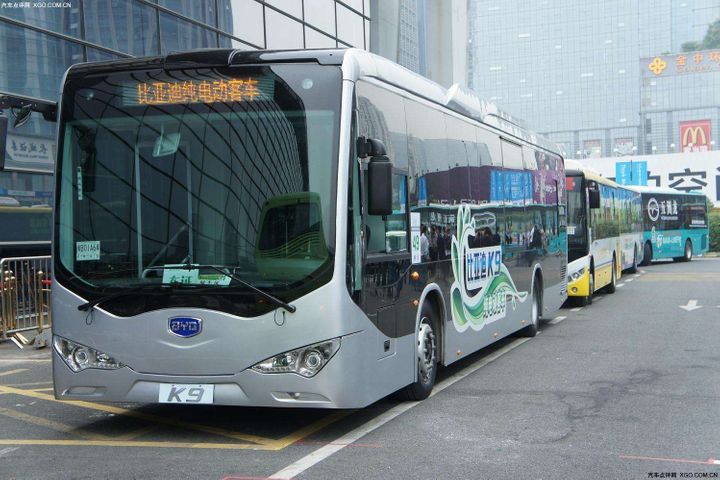 Electric Buses Are a Top Priority for BYD's NEV Business, Its Founder Says
Electric Buses Are a Top Priority for BYD's NEV Business, Its Founder Says(Yicai Global) Aug. 23 -- Chinese electric vehicle manufacturers have ramped up business development, and some of them are catching up with industry leader BYD Co. [SHE:002594] in terms of scale. BYD will focus on electric buses and mini scooters going forward, Wang Chuanfu, the firm's founder, chairman and president, said today. The company's electric bus business will be a top priority that will drive urban charging infrastructure development.
The government is phasing out subsidies for new energy vehicle businesses, and many bus companies have put off electric bus procurement plans and adopted a wait-and-see attitude, but the market has tremendous potential, Wang said.
Some 16,000 electric buses will be rolled out this year in Shenzhen alone, he said.
About 10,000 dump trucks and 5,000 cement mixers there will be replaced by EVs. BYD NEV sales will continue to increase propelled by these growing segments.
The firm will also release new models of electric passenger cars, the biggest segment on the NEV market, he said. A0- and A00-class EVs are expected to be the most popular products among the new models. BYD will unveil several NEVs priced below USD15,000 (CNY100,000) next year, and will develop mini electric scooters within three years.
"A0-class cars currently make up 70 to 75 percent of the total revenue of the Chinese NEV market," the billionaire entrepreneur said. "Thanks to our high-end to low-end approach, BYD has a competitive edge on the NEV market, and will claim a 10 to 20 percent share of the A0- and A00-class market. This will trigger a sales explosion for BYD's EV product lines across the board."
So far, the company does not have any A0- or A00-class cars, and most of its EV models belong to the A and B classes and are priced above CNY150,000.
BYD has limited its marketing efforts primarily to first-tier cities where the local governments have imposed restrictions on vehicle purchases. The company has been ramping up marketing campaigns in more than 200 third- and fourth-tier cities, said Wang.
Charging is more convenient in smaller cities, and consumers in them require vehicles with shorter ranges, he said. With government incentives, these areas have great untapped potential, he said.
BYD will not be affected by the recent partnership deal between Beijing Electric Vehicle Co. and multinational carmaker Daimler AG [FWB:DAI], he said. BYD and Daimler work well together, and although sales of their Denza EV brand did not meet expectations mainly due to pricing issues, sales will improve, he said.
BYD will marketize its auto parts, and batteries are not an exception, Wang said. Wang's statement could mean BYD will supply its batteries to other firms, market insiders said.
BYD's scheme to provide its batteries to other manufactures is nearly set, but the company has not decided if it will spin off its battery unit, a BYD source told Yicai Global.